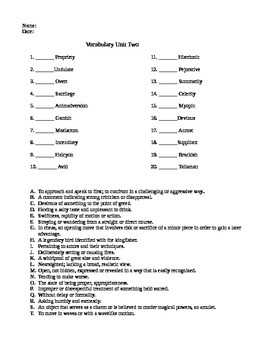
Improving one’s vocabulary skills is a crucial aspect of mastering the English language. Sadlier Vocabulary Workshop Level E Unit 2 offers a comprehensive curriculum designed to enhance your understanding and command of various words. With a focus on synonyms, antonyms, analogies, and completing sentences, this unit provides a range of exercises to challenge and expand your vocabulary.
One of the key objectives of Sadlier Vocabulary Workshop Level E Unit 2 is to help students grasp the nuances of synonyms and antonyms. By exploring words with similar meanings and opposite meanings, students can gain a deeper understanding of context and improve their ability to use words effectively. This unit presents a variety of practice exercises that encourage students to identify and differentiate between synonyms and antonyms.
In addition to synonyms and antonyms, Sadlier Vocabulary Workshop Level E Unit 2 also focuses on analogies. Analogy exercises help students develop critical thinking skills by drawing connections between words and their relationships. By identifying the underlying patterns in analogies, students can sharpen their ability to analyze and comprehend complex vocabulary.
A significant component of Sadlier Vocabulary Workshop Level E Unit 2 is completing sentences with appropriate words. This exercise helps students apply their newfound vocabulary knowledge in context, enabling them to understand how words can be used in different contexts and sentence structures. By actively using the words in sentences, students can further cement their understanding and retention of the vocabulary words.
In conclusion, Sadlier Vocabulary Workshop Level E Unit 2 offers an engaging and comprehensive approach to enhancing vocabulary skills. By delving into synonyms, antonyms, analogies, and completing sentences, students can broaden their range of words, improve their critical thinking abilities, and become more adept at using vocabulary in various contexts. With the answers to the exercises provided, students can self-assess their progress and work towards mastering a richer and more proficient vocabulary.
Sadlier Vocabulary Workshop Level E Unit 2 Answers
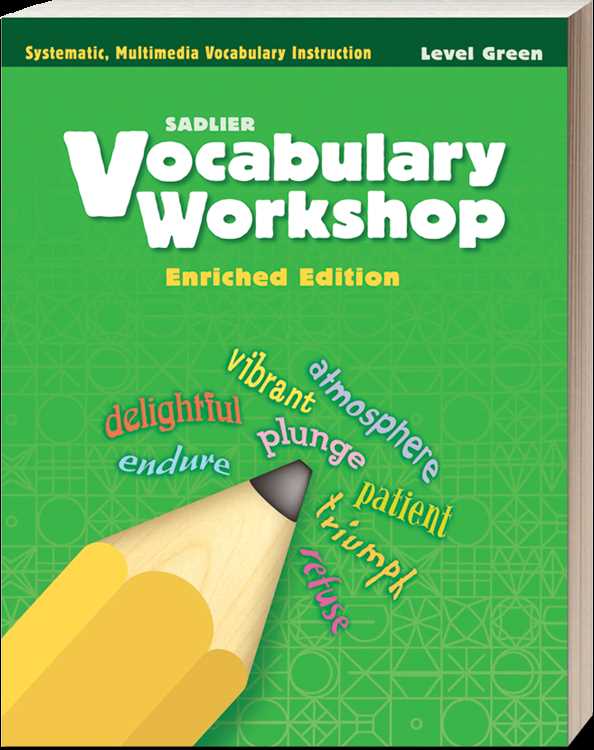
If you are studying the Sadlier Vocabulary Workshop Level E Unit 2, you may be looking for the answers to the exercises and activities in this unit. Unfortunately, we cannot provide you with the answers directly, as it is against our policy to give out or promote solutions for educational materials. However, we can offer you some tips to help you find the answers on your own.
1. Consult your textbook: Start by carefully reading through the unit and paying attention to any hints or explanations given. Often, the answers can be found within the text itself, especially if you have a good understanding of the vocabulary words and their definitions.
2. Use online resources: There are a variety of online resources available that may provide guidance or supplemental materials for your Sadlier Vocabulary Workshop. Look for websites, forums, or study guides that discuss the unit or offer practice exercises. However, be cautious when using these resources, as they may not always provide accurate or reliable answers.
3. Seek help from your teacher or classmates: If you are still struggling to find the answers, don’t hesitate to reach out to your teacher or classmates for assistance. They may be able to offer guidance or clarification on the exercises, helping you to better understand the material.
In conclusion, while we cannot provide you with the specific answers for Sadlier Vocabulary Workshop Level E Unit 2, we hope that these tips will help you in your search. Remember to approach your studies with dedication and a desire to learn, as this will ultimately lead to a deeper understanding of the material.
Understanding Vocabulary Workshop Level E Unit 2
Vocabulary Workshop Level E Unit 2 provides students with a comprehensive and interactive approach to expanding their vocabulary skills. This unit focuses on words related to the theme of “reaching for success” and introduces students to new words and their meanings through various practice exercises and activities.
The unit begins with an overview of the words and their definitions, allowing students to familiarize themselves with the vocabulary before diving into the exercises. Each word is accompanied by example sentences that help students understand how to properly use the word in context. Throughout the unit, students are encouraged to explore the words further through the use of synonyms, antonyms, and word analogies.
The exercises in Vocabulary Workshop Level E Unit 2 are designed to help students practice and reinforce their understanding of the words. These exercises include fill-in-the-blank sentences, multiple-choice questions, and completing sentences with the correct word. Additionally, students are challenged to apply their knowledge through writing exercises and group discussions, allowing for a more interactive and engaging learning experience.
To further enhance their learning, Vocabulary Workshop Level E Unit 2 also provides students with resources such as online quizzes and flashcards. These resources allow students to review the words and their meanings outside of the classroom, enabling them to further solidify their understanding and retention of the vocabulary. Additionally, the unit encourages students to actively engage with the words in their daily lives, whether it be through reading books, watching movies, or having conversations.
In conclusion, Vocabulary Workshop Level E Unit 2 offers students a comprehensive and interactive approach to expanding their vocabulary skills. Through a combination of various exercises, activities, and resources, students are able to enhance their understanding and retention of the words related to the theme of “reaching for success”. This unit not only improves students’ vocabulary skills, but also their ability to effectively communicate and express themselves in both spoken and written English.
The Importance of Vocabulary Building
Vocabulary building is a crucial aspect of language development and communication skills. It plays a vital role in every individual’s ability to express themselves effectively, understand others, and navigate the world around them. Here are some reasons why vocabulary building is important:
1. Enhances Communication:
A rich vocabulary enables individuals to communicate their thoughts, ideas, and emotions more precisely and fluently. Having a wide array of words at one’s disposal allows for clearer expression and reduces the chances of miscommunication or misunderstanding. People with an extensive vocabulary can convey their message with greater precision, making their points more impactful and engaging.
2. Boosts Reading and Writing Skills:
An expanded vocabulary greatly improves reading and writing abilities. When encountering unfamiliar words while reading, individuals with a strong vocabulary can infer the meaning from context more easily, thus enhancing comprehension and enjoyment of the text. Additionally, a robust vocabulary empowers writers to communicate their ideas effectively, making their written work more engaging, persuasive, and captivating.
3. Facilitates Critical Thinking:
A strong vocabulary aids in critical thinking and problem-solving. It allows individuals to grasp complex concepts and ideas, think analytically, and make connections between various pieces of information. People with a diverse vocabulary are better equipped to understand and evaluate arguments, contribute to discussions, and articulate their opinions confidently.
4. Enhances Job Prospects:
In many professions, a good command of vocabulary is highly valued. Whether it’s writing reports, delivering presentations, or communicating with clients, employers often seek individuals who can express themselves articulately and with precision. A strong vocabulary demonstrates intelligence, professionalism, and effective communication skills, which can significantly enhance job prospects and career advancement opportunities.
In conclusion, vocabulary building is an essential skill that contributes to effective communication, reading and writing abilities, critical thinking, and professional success. Investing time in expanding one’s vocabulary is a valuable endeavor that yields lifelong benefits.
Tips for Improving Vocabulary Skills
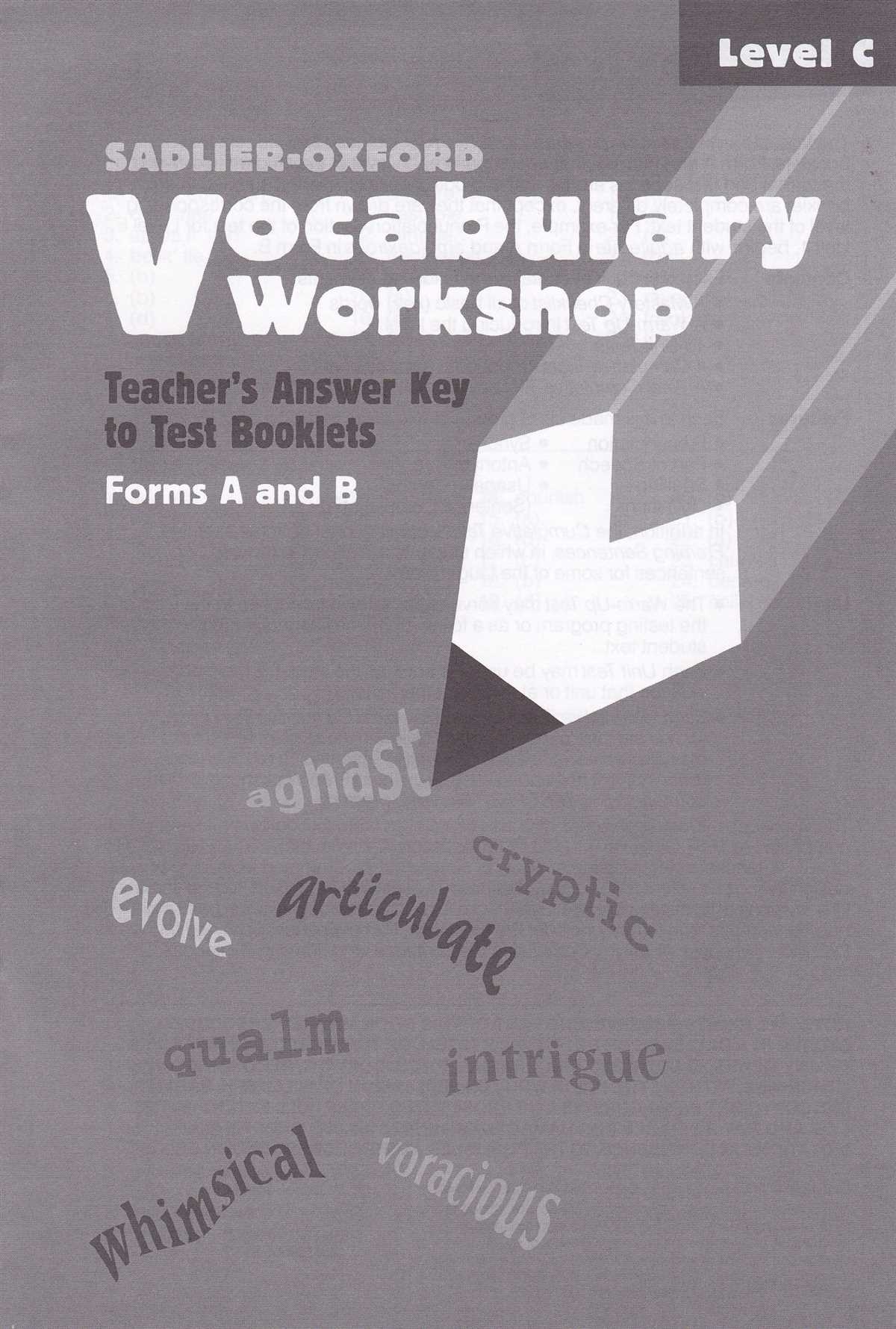
Having a strong and diverse vocabulary is essential for effective communication and comprehension. Whether you are a student looking to improve your academic performance or a professional aiming to enhance your language skills, here are some useful tips to help you expand your vocabulary:
- Read extensively: Make a habit of reading regularly, and expose yourself to a wide range of literature, including books, newspapers, magazines, and online articles. Pay attention to unfamiliar words and look up their meanings to expand your vocabulary.
- Use flashcards: Create flashcards with new words you encounter and their definitions. Review them regularly to reinforce your memory and understanding of the words.
- Practice context clues: When reading or listening to unfamiliar words, try to infer their meanings based on the surrounding context. This skill can help you understand new words without constantly relying on a dictionary.
- Keep a vocabulary journal: Write down new words, their definitions, and example sentences in a notebook or digital document. Review and revise them regularly to reinforce your learning.
- Engage in conversation: Participate in discussions and engage in conversations with others. This allows you to practice using your vocabulary in context and helps you become more comfortable with using new words.
- Play word games: Challenge yourself with word puzzles, crossword puzzles, or vocabulary games. These activities make learning new words more enjoyable and interactive.
- Use online resources: Take advantage of various online resources, such as vocabulary-building websites, apps, and podcasts. These tools provide exercises, quizzes, and interactive lessons to help you expand your vocabulary.
Remember, building a strong vocabulary takes time and effort. Consistency, practice, and curiosity are key to improving your vocabulary skills. Dedicate regular time to learning new words and incorporating them into your daily conversations and writing. With patience and perseverance, you will gradually enhance your language skills and become a more effective communicator.
Reviewing Vocabulary Workshop Level E Unit 2 Words
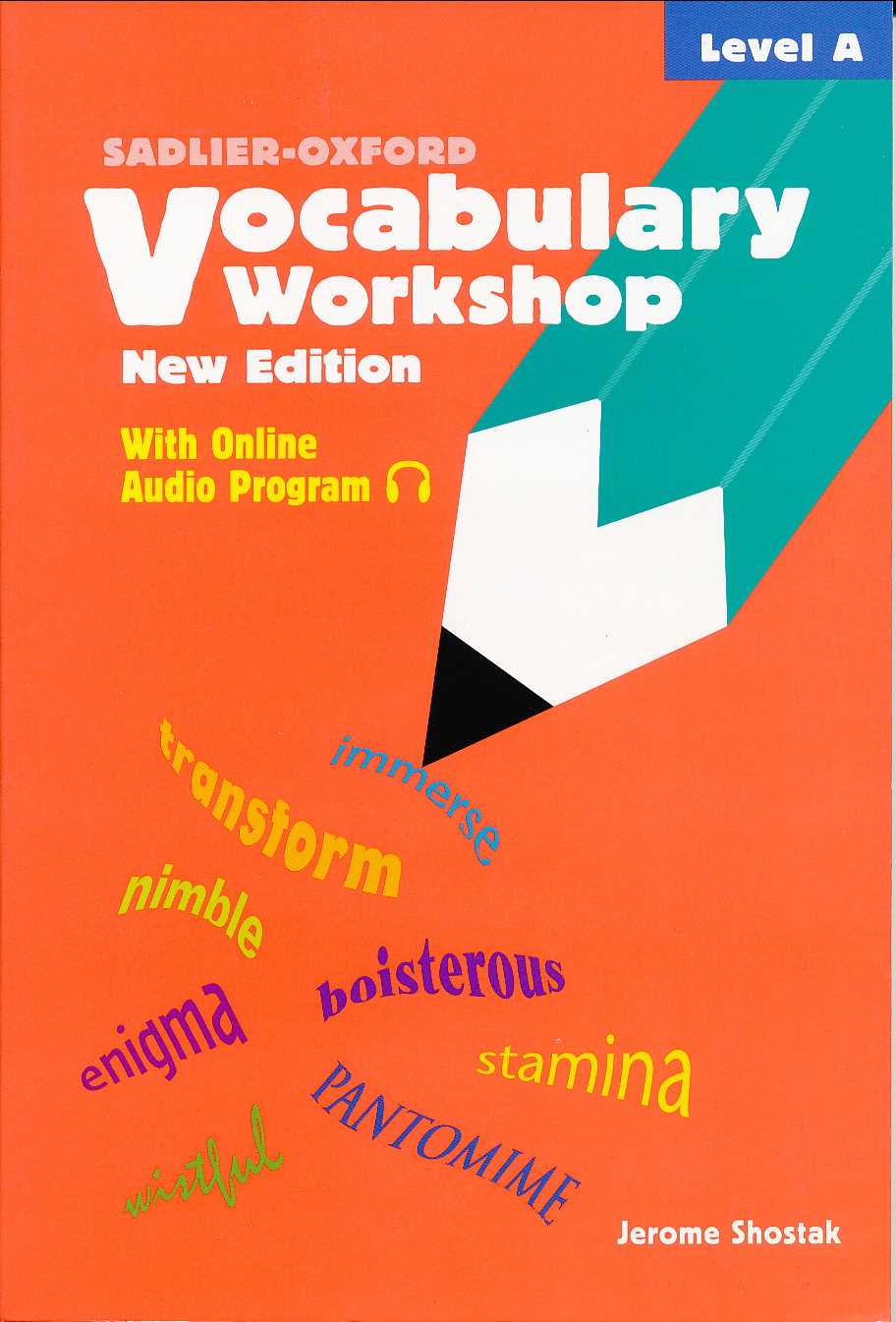
The second unit of Sadlier’s Vocabulary Workshop Level E introduces students to a new set of words that will help them expand their vocabulary and improve their reading and writing skills. This unit is focused on words related to feelings, emotions, and personal characteristics.
One of the key words in this unit is “affable,” which means friendly and easy to talk to. This word can be used to describe someone who is pleasant and approachable, making it easy to strike up a conversation with them. Another important word is “aloof,” which refers to someone who is distant or reserved in social situations. An aloof person might appear cold or uninterested in others.
Other words in this unit include “ambiguous,” which means having multiple meanings or interpretations, making it difficult to understand or interpret something clearly. “Contrite” is another word, which describes someone who is genuinely sorry for their actions and is willing to make amends. On the other hand, “eccentric” refers to someone who is unique or unconventional in their behavior or appearance.
In addition, this unit introduces words like “facetious,” which means treating serious issues or situations with inappropriate humor, and “impassive,” which describes someone who shows no emotional expression or reaction. Another word is “malicious,” which refers to a person who has the intention of causing harm or suffering to others. And finally, “reverence” is a word that describes a deep respect or admiration for someone or something.
Learning and understanding these vocabulary words is essential for students as they continue to develop their reading and writing skills. Not only will these words help them communicate more effectively, but they will also provide them with a deeper understanding of the English language.
How to Use the Sadlier Vocabulary Workshop Level E Unit 2 Answers
Using the Sadlier Vocabulary Workshop Level E Unit 2 Answers can greatly enhance your understanding and retention of the vocabulary words presented in this unit. Here are some tips on how to effectively utilize these answers to improve your vocabulary skills:
1. Review the Words and Definitions
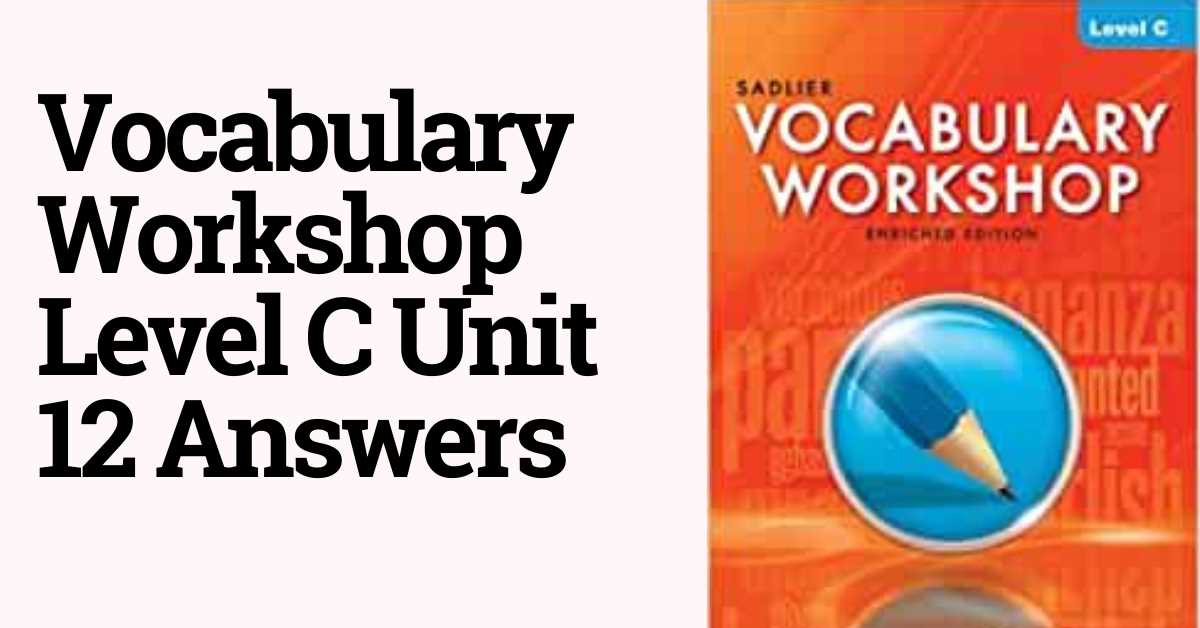
Before diving into the answers, take some time to review the vocabulary words and their definitions. This will give you a general understanding of what each word means and how it can be used in context. It will also make it easier to identify the correct answers as you go through the exercises.
2. Complete the Exercises on Your Own
Once you have familiarized yourself with the words and their definitions, attempt to complete the exercises without referring to the answers. This will help you gauge your level of understanding and identify any areas where you may be struggling.
3. Check Your Answers
After completing each exercise, refer to the Sadlier Vocabulary Workshop Level E Unit 2 Answers to check your work. Pay close attention to the explanations provided for each correct answer, as they can help reinforce your understanding of the words and their meanings.
4. Review any Mistakes or Unclear Concepts
If you made any mistakes or encountered difficulty with certain exercises, take the time to review those words and concepts. Use the provided answers and explanations to better grasp the meaning and usage of the vocabulary words.
In summary, using the Sadlier Vocabulary Workshop Level E Unit 2 Answers can be a valuable tool for improving your vocabulary skills. By reviewing the words and definitions, completing the exercises on your own, and checking your answers, you can strengthen your knowledge and mastery of the vocabulary in this unit.
Common Mistakes to Avoid in Vocabulary Workshop Level E Unit 2
Unit 2 of Vocabulary Workshop Level E introduces a variety of new words and concepts. However, there are some common mistakes that students often make when studying and using these words. By being aware of these errors, you can improve your understanding and usage of the vocabulary. Here are a few common mistakes to avoid:
- Confusing similar words: In Unit 2, you will encounter words that have similar meanings or spellings but different usage. For example, confusing “belittle” and “Berate” or “chide” and “rebuke” can lead to incorrect usage and misunderstanding of the words. Make sure to carefully read and understand the definitions and examples provided for each word to avoid confusion.
- Using words in the wrong context: Each word in Unit 2 has a specific context in which it should be used. Using a word in the wrong context can make your communication unclear or incorrect. For example, using “bountiful” to describe a person’s personality instead of describing a harvest or abundance would be a mistake. Pay attention to the context in which the words are introduced and practice using them correctly in sentences.
- Not practicing the correct pronunciation: Pronunciation plays an important role in effective communication. Mispronouncing words can lead to misunderstandings and confusion. Take the time to listen to the correct pronunciation of the words in Unit 2 and practice speaking them aloud. Focus on the stress and intonation patterns to improve your spoken English.
Avoiding these common mistakes will help you master the words in Unit 2 of Vocabulary Workshop Level E. By understanding the correct usage, context, and pronunciation of the words, you will be able to expand your vocabulary and communicate more effectively in English.